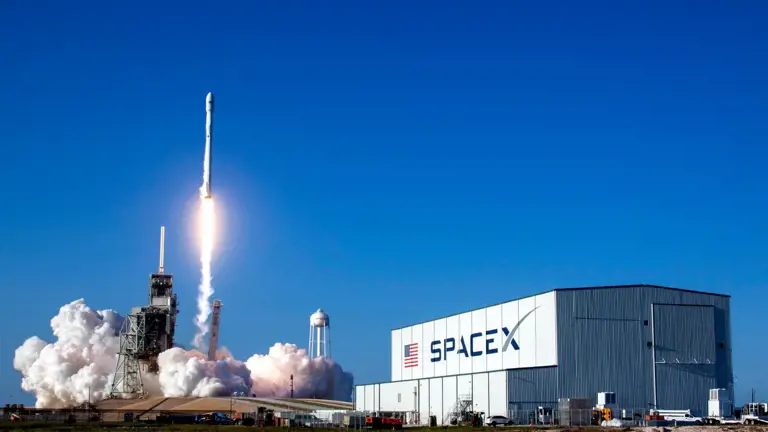In an era defined by the unprecedented reach of technology, the realm of outer space has emerged as the latest arena for asserting dominance on a global scale. The recent proclamation by Russia, explicitly identifying SpaceX satellites as “legitimate targets for retaliatory measures, including military action,” has reverberated across the international community and the burgeoning space industry.
This audacious declaration serves as a stark reminder of the escalating geopolitical tensions among major powers in this uncharted frontier: space.
Russia Threatens US: The Spark That Lit the Fuse
The intricate web of SpaceX satellites destined for espionage and global surveillance.”
© Provided by Gadget Insiders
At the center of this celestial controversy lies a classified agreement, unveiled by Reuters, between SpaceX and a prominent U.S. intelligence agency. This contract, valued at a staggering $1.8 billion, pertains to the deployment of numerous spy satellites as part of the Starshield project.
The entry of Elon Musk’s pioneering space exploration company into military ventures, spearheaded by the visionary entrepreneur himself, underscores the deepening integration of private-sector innovations into national defense strategies.
Maria Zakharova, a spokesperson for the Russian Ministry of Foreign Affairs, has voiced strong opposition to the United States’ reliance on commercial satellite operators for espionage activities. Her comments to Reuters illuminate the mounting apprehension among global powers regarding the increasing militarization of space and the potential for conflict beyond Earth’s atmosphere.
The Unseen War in Orbit
The emergence of space-based weapon systems by the U.S., Russia, and China signifies a notable transformation in global military strategies. This competition for dominance in space has spurred the development of technologies capable of neutralizing enemy satellites, posing a threat to global communication and reconnaissance systems. German military authorities have cautioned against the dire repercussions of deploying nuclear-powered anti-satellite weapons, reportedly under development by Russia. Such advancements could potentially obliterate satellites within their range, jeopardizing not only military intelligence but also civilian activities on a significant scale.
A Closer Look at Starshield
Starshield, SpaceX’s dedicated military division, stands at the forefront of space technology, poised to revolutionize global surveillance capabilities through its ambitious deployment of a vast constellation of spy satellites. With its mission centered on providing the U.S. military with unparalleled access to real-time global intelligence, Starshield aims to usher in a new era of surveillance capabilities.
The constellation of spy satellites, orchestrated by Starshield, promises continuous imaging capabilities that could effectively monitor activities on a global scale, leaving no region hidden from scrutiny. This technological advancement holds the potential to significantly bolster the tactical advantage of the United States in an increasingly information-centric world, where access to real-time data is paramount.
However, the collaboration between SpaceX and the U.S. military has not been immune to controversy. Elon Musk’s decision to restrict the use of Starlink satellite technology by Ukrainian forces during their conflict with Russia has sparked criticism and raised questions about the dual-use nature of space technologies in the context of military conflicts. The incident has prompted inquiries into the ethical considerations and geopolitical implications of deploying advanced space technologies in regions experiencing armed conflict, highlighting the complex intersection of technology, ethics, and global security concerns.
The Uncertain Horizon
As humanity stands at the precipice of a new era characterized by the potential for space warfare, there arises an urgent need for the international community to confront the ethical and practical ramifications of militarizing the cosmos. Russia’s recent threats targeting satellites operated by Elon Musk’s pioneering space exploration company, SpaceX, serve as a stark reminder of the delicate balance of peace in space and the looming specter of conflict extending beyond the confines of Earth.
The evolving relationship between the private sector, exemplified by companies like SpaceX, and national defense assumes heightened significance in this context. With governments increasingly turning to private innovation to gain strategic advantages, the traditional boundaries delineating civilian and military applications of space technology become increasingly blurred. This convergence underscores the complex interplay between commercial interests, national security imperatives, and the broader dynamics of global geopolitics.
In the unfolding saga of what can be likened to a high-stakes game of cosmic chess, the decisions and actions taken by major global powers will shape the trajectory of warfare, surveillance capabilities, and diplomatic relations in the years to come. Against a backdrop of mounting tensions and rapid technological advancements, the vast expanse of space above us remains both a realm of boundless potential and profound peril. As humanity ventures further into the cosmos, navigating the complexities of space governance and security will be paramount to safeguarding the interests of nations and preserving peace in the final frontier.
